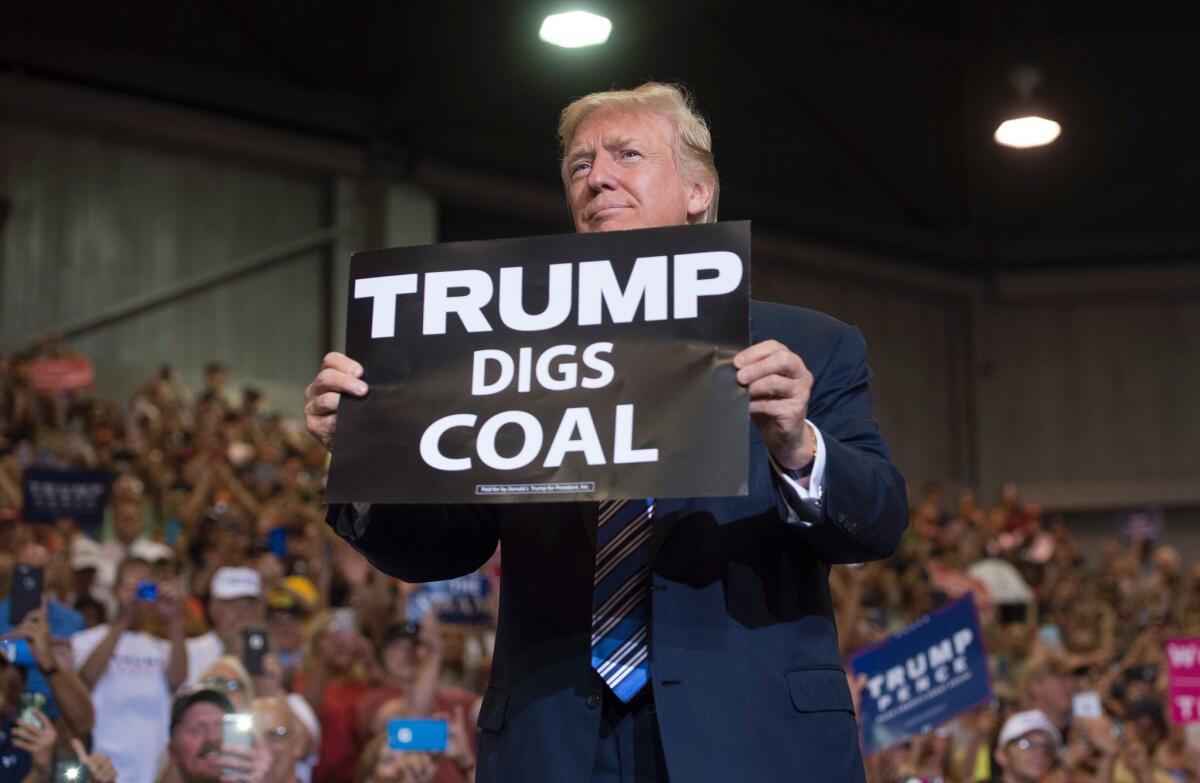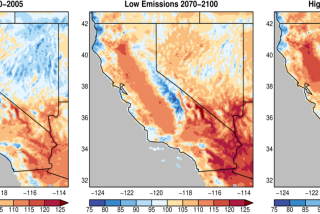Opinion: California sues Trump over greenhouse gas emissions. Now the rest of us need to step up

For more than two years now the Trump administration has been working hard to make this a hotter, more poisonous world, from expanding available leases on public lands for oil, gas and other extractive industries, to throttling back the Obama administration’s efforts to make motor vehicles more fuel efficient, to seeking to replace current emissions regulations for power plants with rules President Trump hopes will revive the failing coal industry.
So the state of California is right to join with 21 other states in suing the administration over its laughably named Affordable Clean Energy rule. Coal is more expensive and dirtier than natural gas or renewables, which means a coal-favoring policy is neither affordable nor clean.
If there’s any good news in the Trump administration’s endless drive to deregulate, it’s that they aren’t very good at it and fail time after time to follow proper legal steps to undo regulations and rules they don’t like. That includes the Affordable Clean Energy plan, and if Las Vegas oddsmakers were handicapping this legal fight, they would be significantly in favor of California and the states prevailing.
That’s one silver lining in the noxious cloud. It’s also good that even if the Trump administration loosens regulations on, say, burning coal to create electricity, that doesn’t mean utilities will reopen shuttered plants or build new ones. Because it doesn’t make financial sense to lock into a physical asset like a power plant for two decades or more when the markets show a steady decline in domestic demand for coal — because it’s cheaper to make electricity without coal.
You’d think a successful businessman, which Trump insists he is, would be able to understand that. But then, bankruptcies.
The industry also looks at a longer horizon than Trump’s next tweet. Even if Trump wins reelection, it’s unlikely he’d be followed by someone with a similarly reckless and irresponsible approach to the environment or to saving humankind from the worst effects of global warming. Energy sector investors know that tighter regulations will follow Trump, either in early 2021 or 2025. And they’re planning for that reality, not this little spasm of lunacy.
Meanwhile, California officials also announced this week that the state’s greenhouse gas emissions fell slightly in 2017 even as the economy and population grew. Not coincidentally, most of the reduction came in the continuing transfer from fossil-fuel power generation in the state to renewables.
But that news also contains two frustrations. First, California needs to reduce emissions by more, and faster, than this pace suggests if we’re to meet the goals of slashing greenhouse gas emissions to 1990 levels by next year, and to 80% below 1990 levels by 2050. Second, emissions from the transportation sector increased by 1%.
That’s not much, but it’s clearly in the wrong direction.
There are government actions to be taken to work on that problem, including California’s agreement with four automakers to adhere to its tighter fuel standards than the Trump administration wants (yes, there’s another lawsuit involved).
But there are also individual actions we can take that collectively would help, including what kinds of motor vehicles we buy, how many trips we make and how we get to and from work. More permissive employer attitudes toward telecommuting would help — one study found that 3.9 million people who worked from home at least half the time in 2017 saved driving 7.8 billion miles and avoided emitting 3 million tons of greenhouse gases.
So sue away, California. But the rest of us can’t just sit back and hope that will be enough to save us from ourselves. Because it won’t be.
More to Read
A cure for the common opinion
Get thought-provoking perspectives with our weekly newsletter.
You may occasionally receive promotional content from the Los Angeles Times.







